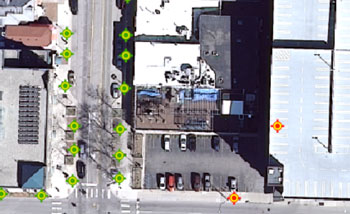Column: A New Agenda for the DDA
Sometime between May 7, 2014 and June 4, 2014, it looks to me like the Ann Arbor Downtown Development Authority board and executive director violated Michigan’s Open Meetings Act (OMA).

Streetlight locations are mapped in the joint Washtenaw County and city of Ann Arbor GIS system. Data available by clicking on icons includes ownership as well as the lighting technology used. Green indicates city ownership. Red indicates DTE ownership.
How? At its May 7 meeting, the board voted to postpone until June 4 a resolution authorizing a $101,733 payment to DTE to convert 212 non-LED streetlights in downtown Ann Arbor to LED technology. But the resolution did not appear on the board’s June 4 agenda.
Instead of voting on the previous month’s resolution – to approve it, reject it, postpone it again or table it – the board listened to an update from executive director Susan Pollay. Pollay told board members that they should assume that the issue is tabled – but possibly not permanently. That decision to table the resolution appears to have been made between board meetings.
The DDA board’s inaction on the funding means that the downtown LED conversion won’t happen in this year’s cycle – because the deadline to apply for a project this year is June 30. So for this year’s program, the city’s energy office will ask the city council – at its June 16 meeting – to authorize money to fund a different project that converts some lights outside the downtown. DTE does not necessarily offer the conversion program every year.
A decision on expending funds is an effectuation of public policy – thus a “decision” under Michigan’s OMA. Even though the decision by the DDA on the streetlight conversion allocation had the practical impact of not expending funds, that should still be analyzed as an effectuation of public policy. And that public policy decision appears to have taken place between board meetings, which is a violation of the core requirement of Michigan’s OMA: “All decisions of a public body shall be made at a meeting open to the public.”
As a practical matter, the only consequence of a court’s finding that the DDA violated the OMA would be to invalidate the DDA’s decision not to expend funds. Why bother to drag the DDA board into court over that? Invalidation of the decision not to expend funds would not force the DDA to go ahead and spend the funds. It would leave things exactly as they are now.
A more economical and time-effective way to address this specific issue would be for DDA board members to publicly recognize and acknowledge their commitment to abide by the OMA – by simply taking a vote on the LED conversion resolution from May 7 at their next meeting, on July 2. It’s surely just as important as the board’s scheduled social gathering at Bill’s Beer Garden on that same day.
That’s also the day when the DDA board’s annual meeting takes place. The annual meeting is when new board officers are elected and committees are appointed. So the annual meeting this year could be an occasion for the DDA to flip a switch, and light itself up with civic tech better than any LED. It would be a chance to re-establish itself as a public body that is committed to rigorous governance – based on strict adherence to its bylaws and the state statute that enables the existence of the DDA.
Presented below are some recommendations for specific actions the DDA board should consider, starting at its annual meeting. The recommended actions would provide an agenda for board work that needs to be done in the coming year.
Here’s a summary of those recommendations: establish strong committees; strictly follow the board bylaws or else change them; consult the archives; and create a development plan that meets state statutory criteria. [Full Story]



